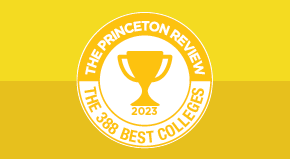You want to challenge yourself. And you want to show admissions committees that you can pass college muster by taking rigorous high school courses.
Taking an Advanced Placement (AP) class in high school and scoring well on the related AP subject exam is a smart choice. Accepted applicants at selective colleges typically have taken multiple AP classes.
What is Advanced Placement?
Advanced Placement (AP) is a program run by the College Board (the same folks who make the SAT and SAT Subject Tests) that offers high school students the chance to take college-level courses in subject that interest them. View the full list of AP subjects.
AP exams are given each year in May. View 2019 AP test dates. Depending on the AP subject, exams are typically a combination of multiple choice and essay questions. AP exams are scored out of 5. Earning a score of 4 or 5 will help you impress the admissions committee at your dream school, and it may help you place out of required introductory level courses during your first year in college.
But how do you choose which AP classes to take?

What AP Classes Should I Take?
1. Which APs are Offered at Your School?
Check with your school counselor for a list of AP classes in your high school. While there are 38 total AP subjects , they are probably not all offered at your school. I n general you should try to take courses each year in English, science, math, the social sciences, and foreign language. Colleges want to see that you are taking on challenges when available, so if your school offers AP courses in any of these areas, you should consider taking them.
2. Where Do You Excel?
Do you love languages? If you’ve been taking Spanish all through high school, you might consider taking AP Spanish Lit or AP Spanish Language as a senior. Are you a history buff? AP U.S. History could be your chance to shine. Consider your past academic performance, and choose subjects that you’ve had previous success in. Artists, take note! There are even AP Studio Art courses in drawing and design.
Read More: Top 5 Ways to Prep for AP Exams
3. What Might You Want to Study in College?
If it’s your dream to be an engineer, for instance, taking AP Physics 1 or AP Physics C allows your transcript to reflect what you say about yourself in your application. AP classes signal to admissions officers that you’re ready for college work. Plus, these courses (and good AP scores on the corresponding exams) can eliminate the need to take foundation classes when you get to your university and allow you to immediately focus on your area of specialization.
How Many AP Classes Should You Take?
The key is to build the most rigourous high school schedule you can while still finding success. Signing up for all AP classes can be a recipe for disaster if you also have other important commitments, such as sports, drama or other extracurricular activities , on your schedule. Remember that colleges look for balance, and a straight academic plate, to the exclusion of everything else, does not make for a well-rounded high school resume .
Bottom Line
If you’re completely at a loss, you can’t go wrong with taking AP courses that correspond to first-year introductory level courses (history, science, and foreign languages). If you do well on your AP exams (scoring a 4 or 5), you might be able to place out of a lot of these required courses, earning college credit and saving you tuition dollars.
We can help make your AP courses easier! Make sure your hard work pays off by working with our expert AP tutors throughout the year.
Will you score a 5?
Test your knowledge with our quick AP quizzes .
Improve your grade and get a better AP exam score with our expert tutors.
Read More
Explore Colleges For You
Connect with our featured colleges to find schools that both match your interests and are looking for students like you.
Get Started on Athletic Scholarships & Recruiting!
Join athletes who were discovered, recruited & often received scholarships after connecting with NCSA's 42,000 strong network of coaches.
Best 388 Colleges
154,000 students rate everything from their professors to their campus social scene.



